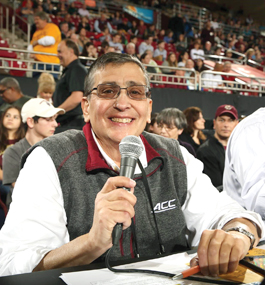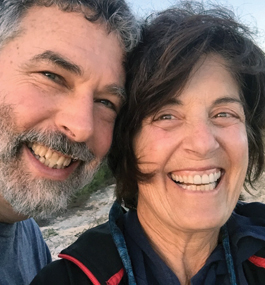
Andy Jick
Andy Jick ’74: The Voice of an Era
Andy Jick ’74 was the Boston Celtics’ public-address announcer from 1980-97, a banner time in the history of that NBA franchise, when Larry Bird, Robert Parish and Kevin McHale joined forces to bring home three championship trophies, in 1981, 1984 and 1986.
Jick’s voice was inextricably linked to those successes. Fans loved his distinctive, drawn-out delivery — “Three-e-e-e-e points for Larry Birrrrd!” “Time out Celllltics!” So when Jick died unexpectedly in his sleep on May 3 at age 66, the outpouring of condolences from athletes, coaches, managers, journalists and sports fans was immediate and heartfelt. “For anyone who enjoyed the iconic run of the 1980s Celtics in the Boston Garden, Andy Jick’s voice provides the soundtrack to those memories,” the Celtics organization tweeted.
Brandeis trustee Dan Jick ’79, P’09, P’12, says his older brother genuinely cared about the coaches, players and staff members he met throughout the years, and developed deep connections off the court. Andy derived joy from “all of the friendships he built along the way,” Dan remembers.
As an undergraduate, Jick managed the Brandeis men’s basketball team and called their home games. In 1978, the Celtics asked him to step in when the team’s regular announcer wasn’t available (a Brandeis alum who worked in the Celtics front office had recommended him). After Jick became the official voice of the Celtics two years later, he handled that high-profile, demanding role while simultaneously holding down full-time corporate jobs.
Jick joined Boston College as its basketball PA announcer in 2001, and added announcing gigs for hockey, lacrosse and baseball in 2012 after retiring from his job at Timberland Co.
“Hearing his voice do our PA made us happy because of how much Andy made us happy,” baseball head coach Mike Gambino told Boston College’s sports-news website after Jick’s death.
The Jick family has strong ties to Brandeis. Like Andy and Dan, Dan’s wife, Elizabeth ’81, P’09, P’12, earned an undergraduate degree at the university; so did Dan and Elizabeth’s children Jamie ’09 and Josh ’12. And Andy and Dan’s late father, Leon, was a professor of Near Eastern and Judaic studies at Brandeis.
Donations in Andy’s memory can be made online at giving.brandeis.edu/makeagift (choose “Other” for the gift designation and type “Andrew Jick Memorial Fund”), or by calling 800-333-1948.
— Heather Salerno

Jane Kahn with her husband, Michael Bien ’77
Jane Kahn ’77: A Prison-Reform Advocate Who Made a Difference
Civil rights attorney Jane Kahn ’77 worked tirelessly on behalf of prisoners and the homeless.
Her efforts made national headlines in 2011 when, in its Brown v. Plata decision, the U.S. Supreme Court ordered California to reduce its prison population by more than 30,000, to relieve overcrowding so severe that it constituted cruel and unusual punishment. Writing for the 5-4 majority, Justice Anthony Kennedy cited evidence from two decades of litigation that Kahn and her husband, Michael Bien ’77, had undertaken on behalf of a class of prisoners with serious mental illness.
But much of Kahn’s work to ease people’s suffering didn’t make news, like the letters she would write to inmates who reached out to her for help.
Kahn — who, along with her high-profile legal career, was also an engaged parent, friend, community volunteer and mentor to young attorneys — “believed that being incarcerated or without a home did not make a person less than human; she recognized the humanity of all around her for every one of her 64 years,” son Joseph Bien-Kahn wrote in an obituary for his mom following her death from cancer in December.
Kahn and Michael Bien met the first day of their freshman year at Brandeis. The couple, who went on to have three sons, worked together at Rosen Bien Galvan & Grunfeld, the law firm Bien co-founded in San Francisco in 1990.
Bien says Kahn saw the law as a way of remedying failures in society and helping “to move the ball of social justice forward.” She spent countless hours inside prisons, and reviewing prison records and letters from clients, to document prisoners’ suffering and advocate for appropriate care. Mentally ill prisoners might wait up to a year for treatment, she found. Suicidal inmates could be held for 24 hours in cages the size of phone booths, without a toilet. She also advocated extensively for homeless families.
Her work took a toll on her. “You open your heart, and you connect with people, and then it’s really hard when you can’t solve their problems,” Bien says. To cope, Kahn founded a program that helps lawyers and legal staff learn techniques to address vicarious trauma and burnout from exposure to heartbreaking situations.
She fought cancer with the same tenacity, son Joseph wrote in his mom’s obituary, “showing bravery and strength until her last day.”
— Abigail Klingbeil
